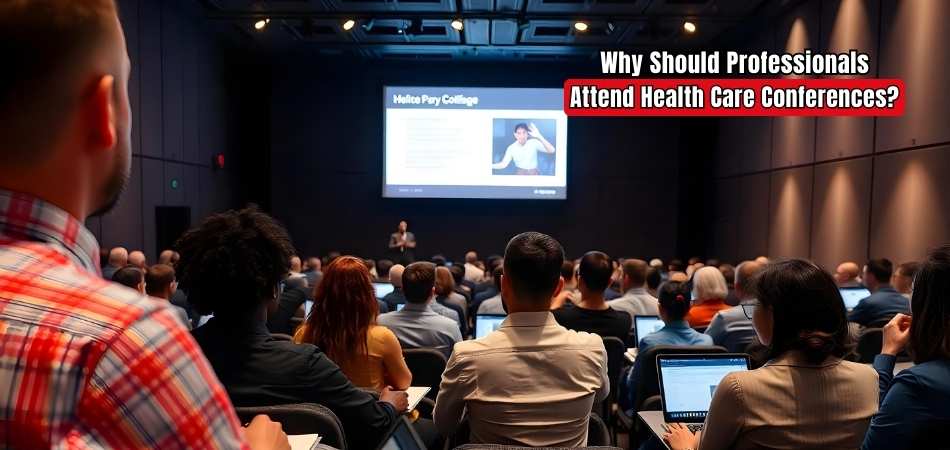Professionals from across the medical industry attend health care conferences to share their ideas, collaborate, and exchange knowledge. These events provide excellent opportunities to learn about the latest advancements and trends in the field of health care. But with so many events available, why should professionals attend health care conferences and prioritize them in their busy schedules?
Health care conferences provide multiple benefits such as professional development through workshops, networking opportunities, and exposure to new technologies. Furthermore, attending such professional conferences can lead to career advancement, while also offering inspiration and motivation from influential industry leaders.
For those looking to succeed in the healthcare sector, these events are very important, so keep reading to find out why they are so important.
The Popularity of Health Care Conferences – What Drives Its Success?
Health care conferences have become increasingly popular due to their pivotal role in advancing medical knowledge and encouraging collaboration among professionals. These events provide an opportunity for experts, researchers, and practitioners to discuss the latest trends, innovations, and challenges in health care, creating a platform for meaningful exchange of ideas and solutions.

The success of these conferences is driven by their ability to address pressing health issues and provide actionable insights. From showcasing the latest technologies to offering networking opportunities, these events enable participants to stay updated with global medical advancements. Additionally, workshops and keynote sessions enhance professional development, making them invaluable for attendees.
Across the globe, including countries like the United States, Canada, and Thailand, health care conferences draw diverse audiences. Notably, health care conferences in Canada have gained recognition for their focus on innovative approaches and inclusivity, attracting professionals from various fields to share their expertise and collaborate.
Who Benefits Most from Attending a Health Care Conference?
Health care conferences provide unique opportunities for growth and networking. These events gather multiple groups from the health sector to learn and share knowledge. Here are the people who will benefit the most from attending these conferences:
Medical Professionals
Doctors, nurses, and other clinicians can stay informed of the latest treatments and medical technologies. These conferences often highlight the latest research and clinical trials. Attendees can earn continuing education units that many licensing boards require. They also get a chance to look at new equipment and pharmaceutical advances.
Health Care Administrators
Healthcare administrators attend conferences to learn new management techniques and strategies. They can discuss pressing industry challenges, like improving patient experience and optimizing resources. This enables them to implement solutions that enhance healthcare facilities. By networking, administrators can collaborate with other organizations and improve their practices.
Medical Students and Residents
Students and residents can familiarize themselves with the professional fields they are about to enter. They gain exposure to the broader medical community and current issues in health care. Mentorship opportunities abound, with chances to meet potential guides and employers. Conferences can also inspire them about their future career paths.
Researchers and Academics
Conferences are essential for medical researchers who present their work. These conferences can receive feedback from peers and find new research opportunities. Collaborations with other scientists can lead to significant advancements. This exposure can also help them in securing funding for their projects.
Policy Makers and Health Advocates
Policy makers gather insights on public health issues and emerging medical trends. They can use this information to draft more effective health policies. Networking with health care professionals helps reveal the practical impacts of these policies. Advocates can also find support for their causes and increase public awareness.
Why Should Professionals Attend Health Care Conferences?
Health care conferences are valuable events where professionals can expand their knowledge and connect with others in their field. These events offer plenty of opportunities for career growth, networking, and learning about the latest advancements. The following are some reasons why every healthcare professional should attend:
Expanding Professional Knowledge
Conferences provide access to the latest research and developments in healthcare. Here, attendees gain knowledge that strengthens their professional knowledge and skills. The topics and innovations discussed in workshops and seminars are deep and rich in content. This expanded knowledge eventually benefits their practice and patient outcomes.
Networking with Industry Peers
Meeting like-minded professionals is one of the core benefits of attending health care conferences. Networking creates opportunities for collaboration and idea-sharing. Establishing connections can lead to partnerships or support for challenging projects. These relationships often carry on beyond the event, enriching one’s professional network.
Building a Career Path
Conferences offer unique resources to support career growth for healthcare professionals. From skill-building workshops to leadership training, participants gain important career skills. Aside from that, industry insights from these conferences provide fresh perspectives on career advancement. This focus on growth can open doors to new roles and responsibilities.
Exposure to Advanced Technologies
Attendees learn about and interact with the latest medical technologies at conferences. These innovations include new diagnostic tools, treatment methods, and healthcare software. A hands-on experience allows students to gain a better understanding of technological advancements. As a result of exposure to these tools, professionals are able to effectively integrate them into their practices.
Developing Key Skills
Workshops and sessions offer skill-building opportunities across various healthcare disciplines. Attendees can improve both technical and soft skills during these sessions. Gaining new skills empowers professionals to maximize their effectiveness. Career advancement is also made possible by continued competency development.
Chance of Presenting Papers
Professionals usually have the opportunity for presenting papers at health care conferences, showcasing their research and insights. This experience allows them to share their findings with an engaged audience. Feedback from peers during presentations allows them to improve their work. Sharing ideas encourages growth and can spark collaborations.
Gaining Inspiration and Motivation
Conferences offer a great chance to hear from leaders and visionaries in healthcare. Listening to keynote speakers can reignite a passion for the field. These experiences inspire professionals to bring innovative ideas to their practice. It is possible to grow both professionally and personally if you gain motivation.
Are Health Care Conferences Easy to Find?
Yes, health care conferences are relatively easy to find. Many organizations and associations list upcoming events on their websites. These listings are usually searchable by location, topic, or date, making it simple to plan attendance.
Additionally, medical journals and industry newsletters often advertise these conferences. Online platforms and social media groups dedicated to health care professionals also share updates. Signing up for alerts or following relevant organizations can keep you informed about new events.
Furthermore, universities and hospitals frequently host and promote health care conferences. Attending local events or asking colleagues for recommendations can lead to discovering more opportunities. Often, valuable conferences aren’t widely advertised and can be found through networking within professional circles.
Steps Professionals Can Take to Attend a Health Care Conference
Professionals can gain a lot from attending a health care conference because it allows them to expand their knowledge and build connections. With some planning, professionals can make the most of these events. The following process can assist professionals in planning and attending conferences effectively:
Step 1: Research Upcoming Conferences
Begin by identifying relevant conferences that match your field and interests. Look for events that align with your professional goals. Check reputable industry websites and organizations for conference listings. When you do your research early, you will be able to find the best options to suit your needs.
Step 2: Set Clear Objectives
Determine what you hope to gain by attending the conference. Are you looking to network, learn, or discover new tools? Clear goals will guide your choices of sessions and activities. With objectives in mind, you’ll maximize the benefits of attending.
Step 3: Plan Your Budget
Budgeting is essential to make your conference attendance feasible. Calculate costs for travel, accommodation, and meals, in addition to the registration fee. Look for early-bird discounts or scholarships if available. Budgeting allows you to attend without unexpected financial stress.
Step 4: Complete the Registration Process
When it comes to carrying out the registration process for health care conferences, start by reviewing all the guidelines and requirements. Don’t miss out on early or regular registration deadlines. Make sure to save any confirmation details or receipts for your records. If you register early, you will be able to participate in key sessions and ensure your place.
Step 5: Arrange Travel and Accommodation
Book flights and lodging as soon as your attendance is confirmed to secure the best options. Choose accommodations close to the venue for convenience. Consider public transportation options or shuttles if available. Early booking reduces last-minute hassles and potential delays.
Step 6: Prepare for Active Participation
Review the conference schedule and select sessions that align with your objectives. Prepare any questions or topics you want to discuss. If you’re presenting, finalize and practice your presentation. Arriving prepared ensures a fulfilling and productive conference experience.
Visits to Health Care Conferences: How Professionals Can Avoid Challenges?
Conferences can be beneficial for health care professionals, but they may also face challenges. With a little preparation, these obstacles are manageable. Here are practical tips for avoiding common issues when attending conferences:
- Plan Ahead for Popular Sessions: Popular sessions fill up quickly, so arrive early to secure a seat. Pre-select sessions based on your interests and goals.
- Set a Realistic Schedule: Avoid scheduling back-to-back sessions, allowing time for breaks. This will help you stay refreshed and avoid conference fatigue.
- Manage Your Budget Wisely: Conference costs can add up quickly, so allocate funds carefully for travel, meals, and lodging. Look for discounts and early registration offers.
- Pack Essentials for Long Days: Bring essentials like water, snacks, and a charger to stay energized. Comfortable clothing and shoes are a must for all-day comfort.
- Prioritize Networking Opportunities: Networking can be overwhelming, so prioritize key contacts and events. Have business cards ready and approach people with genuine interest.
- Use Technology to Stay Organized: Conference apps can help track sessions and connect with other attendees. Download the app in advance to familiarize yourself with its features.
- Take Notes During Sessions: Bring a notebook or tablet to record key insights. This helps retain valuable information you can refer to after the event.
- Plan Downtime to Recharge: Conferences can be intense, so schedule downtime to rest and reflect. Taking breaks will help you get the most from the experience.
FAQs About Why Should Professionals Attend Health Care Conferences?
Conferences in health care offer unique opportunities for learning, networking, and growing. For professionals looking to advance, these conferences offer insights and experiences that are difficult to find elsewhere. Below are frequently asked questions to help you realize the value of attending health care conferences.
How Can Conferences Assist in Managing Work-Life Balance?
Sessions focused on self-care and wellness at conferences address the extra stresses of health care work. These discussions provide techniques for managing burnout and work-life balance, ensuring professionals maintain both career longevity and personal well-being.
What Types of Innovations Are Showcased at Conferences?
Conferences often feature the latest technologies, treatments, and research in healthcare. This includes new diagnostic tools, medical devices, and software that improve patient outcomes and streamline processes, providing attendees with firsthand exposure to industry advancements.
Are Health Care Conferences Suitable for Non-Clinical Staff?
Non-clinical staff, such as medical coders, billing specialists, and office managers, can benefit from conference sessions relevant to their roles. Topics often include regulatory updates, best practices, and technological advancements relevant to administrative roles in health care.
What Kind of Networking Opportunities Exist at Conferences?
Conferences offer structured and informal networking, including mixers, workshops, and panel discussions. These settings make it easy to connect with others in similar fields. Building professional relationships at conferences can lead to future partnerships and valuable industry connections.
How Do Exhibitions Contribute to Health Care Conferences?
Exhibitions showcase the latest healthcare products, services, and technologies. Attendees can interact with vendors and gain firsthand experience with new tools. This hands-on exposure aids in considering innovations that could enhance patient care and operational efficiency.
Final Thoughts
Professionals who wish to stay current and expand their expertise in the medical field should attend health care conferences. A variety of benefits can be gained from these events, including professional development, networking, exposure to new technologies, and career advancement.
So, why should professionals attend health care conferences? Because these events provide a unique platform for sharing knowledge, building connections, and finding inspiration from industry leaders. Attending these conferences equips professionals with essential skills and insights that directly boost their practices and patient care.
In addition to attending workshops, healthcare professionals learn about innovations and interact with colleagues. In the long run, conferences help create a more knowledgeable, collaborative, and forward-thinking healthcare community.







